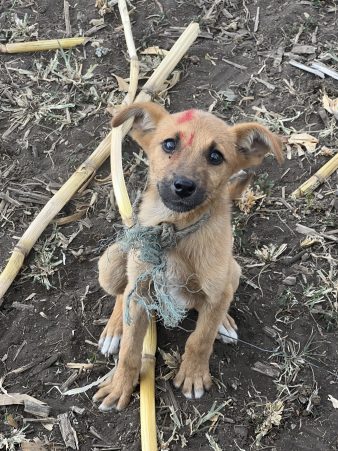Santa Barbara Veterinarian Part of Worldwide Effort
to End Rabies Deaths
Dr. Beverly Holmes Spent Three Hot Weeks in Tanzania
Vaccinating Thousands of Dogs
By Tyler Hayden | March 16, 2023

Read all of the entries in our “Pets & Animals, 2023 Edition” cover here.
Rabies is one of the oldest and most terrifying diseases known to man. With common symptoms of aimless wandering, sudden aggression, and indiscriminate biting, it has inspired a whole canon of zombie-themed fiction. The disease is also one of the deadliest. Once symptoms appear as the bullet-shaped virus travels through the nervous system and replicates in the brain, it’s nearly 100 percent fatal.
Most of the world stamped out rabies over the last century. Yet it persists in poor and marginalized communities across Asia and Africa, killing an estimated 59,000 people annually, the majority of whom are children. Ninety-nine percent of cases are a consequence of dog bites, resulting in the regular fear-induced slaughter of healthy animals.
Veterinarian Dr. Beverly Holmes, co-owner of La Cumbre Animal Hospital, knew all of this when she attended a medical conference several years ago, but it was there that she realized she could actually do something about it. Holmes learned of Mission Rabies, an international coalition of vets who travel across the globe dispensing vaccines to dogs and education to people with the goal of ending human deaths from rabies by 2030. “When I heard about it,” Holmes said, “I thought, ‘I need to do this.’ ”
Holmes recently returned from a “dusty but beautiful” trip to Tanzania, where she and a dozen other vets spent three weeks vaccinating approximately 6,000 dogs. Their goal was 10,000, but global conflict got in the way — tensions with ISIS in East Africa temporarily halted their efforts upon arrival. In their downtime, the team set up an impromptu spay and neuter clinic, and for the rest of the trip they stayed mobile so as not to become targets.

Their daily routine, as Holmes explained it, began early in the morning at base camp. The group would fan out in different directions along bumpy roads, receiving “African massages” as Mt. Kilimanjaro came into view. Sometimes, they’d stop to let giraffes cross. Using a tracking app on their phones, they’d identify which communities to visit and where unvaccinated dogs were likely to be found.
In Tanzania, most dogs are not considered pets, Holmes said. Those that “belong” to families exist alongside their cattle and goats, while others roam streets and the tree-line in loose packs. Nearly all fit the same physical description — medium-sized mutts, 30-35 pounds, tan in color. Villagers (it was usually children, as their parents were busy working) would lead dogs with ropes, chains, and branches to the veterinarians, who would make quick work with their syringes and mark the animals with a big Crayola pen.
Herd immunity for an area, Holmes explained, was considered 70 percent. If the initial team believed they didn’t hit that number, another team would come through and vaccinate as many of the unmarked dogs as they could, though they understood that many simply couldn’t be wrangled. “They would be part of the 30 percent,” Holmes said.
The response from the people they encountered was overwhelmingly positive, Holmes said. Many had lost family or friends to rabies. “People really support the effort,” she said. When they weren’t working, the vets would indulge kids who don’t have access to mirrors with selfies on their phones. Snapchat filters were a big hit.
As long and as hot as the days were, Holmes said, she would do it again. “I would definitely go on another trip,” she said. “I left feeling like there’s so much more to do.” Mission Rabies is such a worthy project, she went on, as it offers “a tangible way to save animals’ and children’s lives.” And she encourages other veterinarians to sign up. “We need people to get out there and get their hands really dirty,” she said.
Learn more at missionrabies.com.




You must be logged in to post a comment.